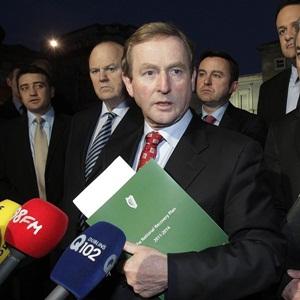Nobody voted for this Programme for Government

Enda Kenny has had a charmed 11 days as Taoiseach, writes Vincent Browne.
He has appeared assured in the Dáil, impressive in his public utterances in Brussels and at home, and fortunate in the St Patrick's Day visit to the White House. Certainly, there are tough times ahead and, ideally, there will be a crisis soon on Ireland's solvency, so that the issue of the bank debt can be sorted quickly. But so far, so good.
The visits of the US president and the British monarch to Ireland in May will offer him a statesman's stage, to seem all the more impressive and credible. The anxieties about him have abated - at least for now. He may transpire to be more formidable than any Taoiseach we have known for a while. The Fianna Fáil shambles of a government is already a receding memory. Only Brian Lenihan's remarks about the alleged lassitude of Brian Cowen prompt recollection of an era that was only the week before last...
It's a pity they did not take more time in shaping the new government. The dispersal of portfolios was not as calculated as it might have been.
Why, for instance, Pat Rabbitte in Communications, Energy and Natural Resources - particularly as Leo Varadkar had mastered that brief over the previous year? And the failure to avail of the expertise of Pat Rabbitte, Joan Burton and Richard Bruton directly on the banking, economic and jobs crisis is a misfortune that could still be undone, but probably won't be.
Had the White House trip not been such a success - thanks to the presidential visit announcement - we might have had reason to wonder about the appropriateness of the Irish prime minister going to the capital of another country to pay homage on the national holiday. In what other country does the prime minister go to another country and feel so grateful to be honoured with a special audience by the head of state of that visited country? Isn't there something of an abasement about that? Could we stop it now?
One of the claims of this new government concerns the mandate it has received from the electorate and the 90-vote majority on the appointment of the government. The mandate stuff is mistaken.
First, the country did not vote for the Programme for Government. Nobody at all voted for that in the elections of 25 February. People may have voted for elements of Fine Gael's manifesto and for elements of the Labour manifesto, but they did not vote for the composite that is the Programme for Government.
It might be argued that this programme is a compromise between the two manifestos, and politics essentially is about compromise. It is certainly true that politics is about compromise; our social living is about compromise in the most elementary sense. If Fine Gael and Labour had put the Programme for Government before the electorate on 25 February, there would be some sense that there was a mandate for what it contained. It would have been more honest, as both parties knew in advance they would end up in government together. But that did not happen.
Aside from that, there is a crudity about general elections. In this last election, many voted for Fine Gael and Labour simply because they were not Fianna Fáil.
Others may have voted Fine Gael or Labour because they thought one or both of them might be able to negotiate a better deal on the EU/IMF rescue package than Fianna Fáil could manage. Some may have voted for one or other of these parties because of their health policies - or in spite of their health policies.
We don't know what is mandated by general elections, other than some parties are mandated to go into government and others are not. It is simply ridiculous to claim that the Programme for Government won a mandate, or that any of the manifestoes did.
As an exercise in self-government, general elections are a very rough and inadequate agency. That, of course, can be overcome by the electorate being given the opportunity to decide on issues directly, through referendums. But the politicians don't like their power over major issues being subjected to approval by the people, and all sorts of contrived arguments are deployed to dismiss any form of direct democracy.
These include the claim that the people don't understand the complexities of major issues, so their judgment on them cannot be relied on; that outcomes may emerge from direct election of which we would probably disapprove; that the mechanism is too cumbersome; that asking the people to decide on every tiny decision would be chaotic; that the people would be swayed by emotional and irrelevant arguments.
Most of these propositions were advanced against the idea of universal suffrage. How could an ignorant people be trusted to vote in the people best qualified and suitable to govern the country?
We might not like the outcomes from direct elections, but isn't that democracy? Isn't the whole point that the people be self-governing? That government should be of the people, by the people and for the people?
